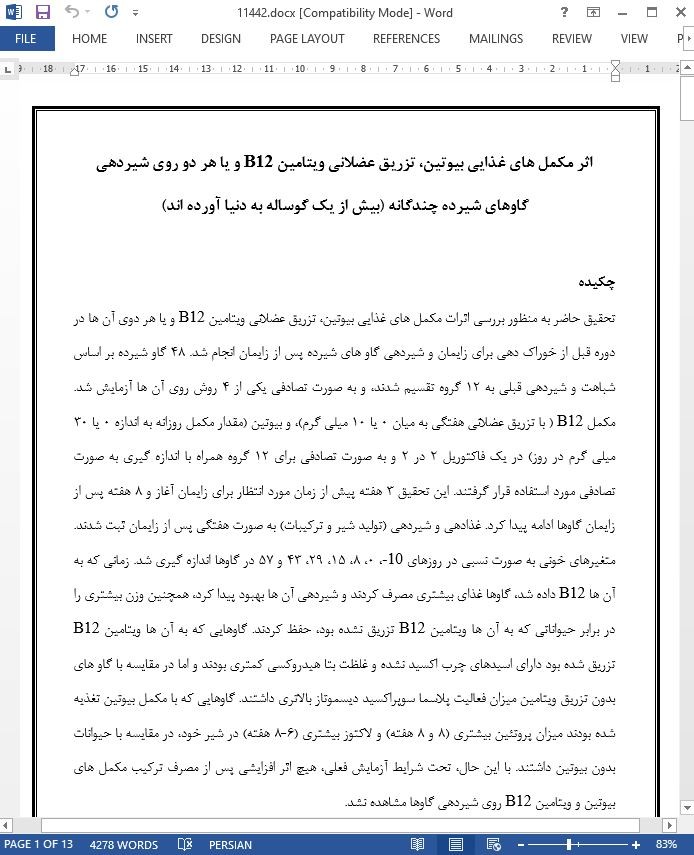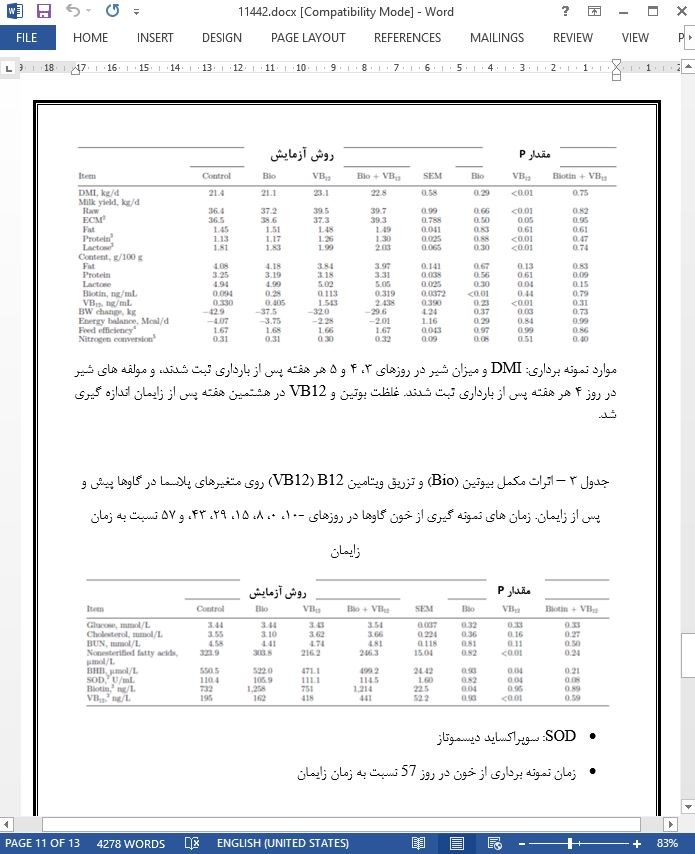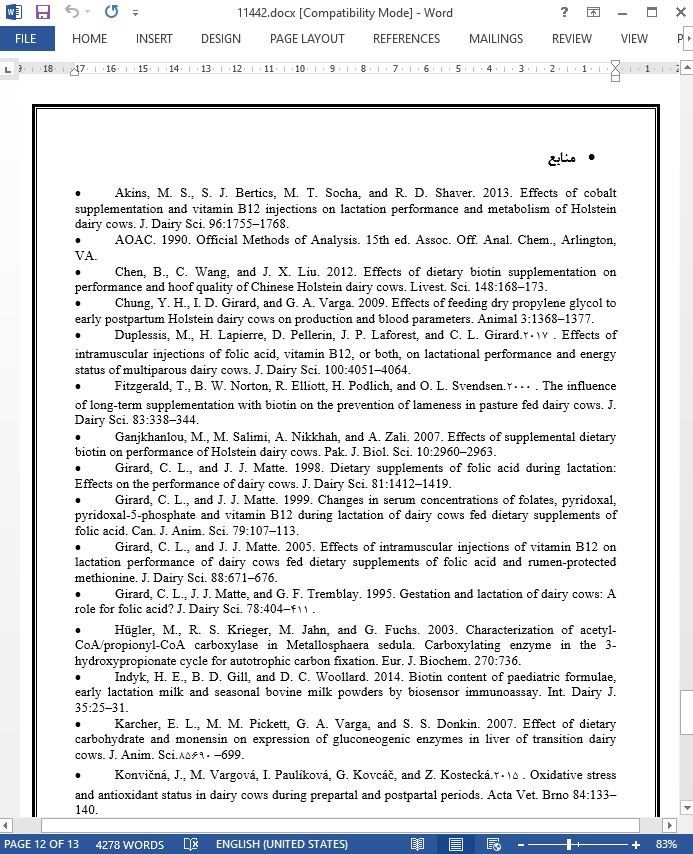
اثر مکمل های غذایی بیوتین، تزریق عضلانی ویتامین B12 و یا هر دو روی شیردهی گاوهای شیرده چندگانه
چکیده
تحقیق حاضر به منظور بررسی اثرات مکمل های غذایی بیوتین، تزریق عضلانی ویتامین B12 و یا هر دوی آن ها در دوره قبل از خوراک دهی برای زایمان و شیردهی گاو های شیرده پس از زایمان انجام شد. 48 گاو شیرده بر اساس شباهت و شیردهی قبلی به 12 گروه تقسیم شدند، و به صورت تصادفی یکی از 4 روش روی آن ها آزمایش شد. مکمل B12 ( با تزریق عضلانی هفتگی به میان 0 یا 10 میلی گرم)، و بیوتین (مقدار مکمل روزانه به اندازه 0 یا 30 میلی گرم در روز) در یک فاکتوریل 2 در 2 و به صورت تصادفی برای 12 گروه همراه با اندازه گیری به صورت تصادفی مورد استفاده قرار گرفتند. این تحقیق 3 هفته پیش از زمان مورد انتظار برای زایمان آغاز و 8 هفته پس از زایمان گاوها ادامه پیدا کرد. غذادهی و شیردهی (تولید شیر و ترکیبات) به صورت هفتگی پس از زایمان ثبت شدند. متغیرهای خونی به صورت نسبی در روزهای -10، 0، 8، 15، 29، 43 و 57 در گاوها اندازه گیری شد. زمانی که به آن ها B12 داده شد، گاوها غذای بیشتری مصرف کردند و شیردهی آن ها بهبود پیدا کرد، همچنین وزن بیشتری را در برابر حیواناتی که به آن ها ویتامین B12 تزریق نشده بود، حفظ کردند. گاوهایی که به آن ها ویتامین B12 تزریق شده بود دارای اسیدهای چرب اکسید نشده و غلظت بتا هیدروکسی کمتری بودند و اما در مقایسه با گاو های بدون تزریق ویتامین میزان فعالیت پلاسما سوپراکسید دیسموتاز بالاتری داشتند. گاوهایی که با مکمل بیوتین تغذیه شده بودند میزان پروتئین بیشتری (8 و 8 هفته) و لاکتوز بیشتری (6-8 هفته) در شیر خود، در مقایسه با حیوانات بدون بیوتین داشتند. با این حال، تحت شرایط آزمایش فعلی، هیچ اثر افزایشی پس از مصرف ترکیب مکمل های بیوتین و ویتامین B12 روی شیردهی گاوها مشاهده نشد.
مقدمه
گلوکونوژنز کبدی نقش مهمی در تولید گلوکز کبدی خالص داشته (Reynolds, 2006) و منجر به افزایش گلوکززایی کبدی به شیوه ای کارآمد شده و سبب افزایش میزان شیردهی در گاوهای شیرده می شود (Rukkwamsuk et al., 1999; Karcher et al., 2007). در گلوکونوژنز، پروپیونات جذب شده توسط سلول های کبدی از متیل مالونی – CoA به پروپیونیل- CoA کربوکسیلاز تبدیل می شود که یک آنزیم وابسته به بیوتین است (Scott, 1999; Hügler et al., 2003) و ایزومری شدن بیشتر به ساکسینیل – CoA به وسیله متیل مالونی CoA موتاز، یک ویتامین B12 (VB12) آنزیمی وابسته می شود (Padmakumar et al., 1997). بنابراین اثری اضافی پس از تزریق VB12 و یا بیوتین مورد انتظار می باشد که ناشی از حمایت این دو ماده است.
نتیجه گیری
تزریق هفتگی VB12، که در مرحله پیش از زایمان آغاز شده باشد، میزان DMI پس از بارداری، و شیردهی را افزایش داده و میزان از دست دادن وزن بدن را کاهش می دهد. بوتین تاثیر ناچیزی روی شیردهی داشته اما اثر وابسته به زمان قابل توجهی را روی مقدار پروتئین و لاکتوز شیر داشت. تحت شرایط آزمایشگاهی حاضر، اثر تعاملی را در زمینه استفاده ترکیبی از بویتن و VB12 روی میزان شیردهی گاوها مشاهده نکردیم.
ABSTRACT
The current study was conducted to investigate the effects of dietary supplementation of biotin, intramuscular injections of vitamin B12 (VB12), or both beginning at the prepartum period on feed intake and lactation performance in postpartum dairy cows. Forty-eight dairy cows were allocated into 12 blocks, based on parity and milk yield of the previous lactation cycle, and randomly assigned to 1 of 4 treatments. Supplementation of VB12 (weekly intramuscular injections of 0 or 10 mg) and biotin (dietary supplements of 0 or 30 mg/d) were used in a 2 × 2 factorial arrangement in a randomized complete block design of 12 blocks with repeated measures. The study started at 3 wk before the expected calving date and ended at 8 wk after calving. Feed intake and lactation performance (milk yield and composition) were recorded weekly after calving. Blood variables were measured on d −10, 0, 8, 15, 29, 43, and 57 relative to calving. When VB12 was given, the cows had greater feed intake, better lactation performance and lower body weight loss in the postpartum period compared with animals without injection of VB12. The VB12-injected cows had lower plasma nonesterified fatty acids and β-hydroxybutyrate concentrations but higher plasma superoxide dismutase activity compared with cows without VB12. Cows fed a biotin supplement had higher milk protein yield (6 and 8 wk) and lactose yield (6–8 wk), compared with animals without biotin. However, under the present experimental conditions, we found no additive effect of a combined supplement of biotin and vitamin B12 on lactation performance of dairy cows.
INTRODUCTION
Hepatic gluconeogenesis plays an important role in net hepatic glucose generation (Reynolds, 2006), and increasing hepatic gluconeogenesis is an efficient way to increase the milk yield in lactating dairy cows (Rukkwamsuk et al., 1999; Karcher et al., 2007). In gluconeogenesis, the propionate absorbed by hepatic cells is transformed to methylmalonyl-CoA by propionyl-CoA carboxylase, a biotin-dependent enzyme (Scott, 1999; Hügler et al., 2003), and further isomerized to succinylCoA by methylmalonyl-CoA mutase, a vitamin B12 (VB12)-dependent enzyme (Padmakumar et al., 1997). Thus, a beneficial effect would be expected when additional VB12 or biotin is provided to the dairy cows with an insufficient supply in VB12 or biotin during early lactation.
CONCLUSIONS
Weekly injection of VB12, starting at the prepartum stage, increased postpartum DMI and lactation performance and reduced BW loss of dairy cows. Biotin had a limited effect on overall lactation performance but did show a time-dependent effect on protein and lactose yield. Under the present experimental conditions, we found no interactive effect of a combined supplement of biotin and vitamin B12 on lactation performance of dairy cows.
چکیده
مقدمه
مواد و روش ها
حیوانات، رژیم های غذایی، طراحی تجربی
DMI، تولید شر و ترکیبات شیر
نمونه برداری خون
وضعیت BW و تعادل انرژی
تحلیل آماری
نتایج
متغیرهای پلاسما
بحث
نتیجه گیری
ABSTRACT
INTRODUCTION
MATERIALS AND METHODS
Animals, Diets, and Experimental Design
DMI, Milk Production, and Milk Composition
Blood Sampling
BW and Energy Balance Status
Statistical Analysis
RESULTS
Feed Intake, Lactation Performance, and BW Change
Plasma Variables
DISCUSSION
CONCLUSIONS
- اصل مقاله انگلیسی با فرمت ورد (word) با قابلیت ویرایش
- ترجمه فارسی مقاله با فرمت ورد (word) با قابلیت ویرایش، بدون آرم سایت ای ترجمه
- ترجمه فارسی مقاله با فرمت pdf، بدون آرم سایت ای ترجمه



